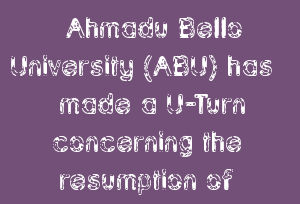Communications And EntertainmentNews And PoliticsSports And FitnessNewsBusiness And MoneyArts And EducationEngineeringSportsHealth And LifestyleReligion And PrinciplesLifestyleMotivationalsFood And KitchenLawEntertainmentBusinessHealthGeneralLifetipsUSMLE And MedicalsVehicles And MobilityScience And TechnologyFamily And HolidaysWorldpoliticsEducationInformation TechnologyArtsGive AidCelebrityFoodReligionSecurityNigeriapoliticsMotivationComedyMoneyNatureScienceStoriesVehiclesHistoryAgricultureRelationship And MarriageSpirituality
profile/3696FB_IMG_166154600052001842.jpg
Ndoma

Ahmadu Bello University (ABU) Has Made A U-Turn Concerning The Resumption Of Academic Activities.
~1.7 mins read
Following the second wave of coronavirus, the management of Ahmadu Bello University (ABU) has announced that the planned resumption has been suspended, Daily Trust reports.
The school’s director, public affairs directorate, Auwalu Umar revealed that the institution will not resume academic activities on Monday, January 25, as earlier scheduled.
According to Umar, a verification team was sent to the institution on Wednesday, January 20, by the Kaduna state government to assess its compliance with the COVID-19 preventive protocols.
Ahmadu Bello University (ABU) has made a U-Turn concerning the resumption of academic activities. Photo credit: @arewacycle
The director went on to note that the university is still awaiting directives from the state government before the resumption of academic activities.
Nigerian governor sacks 65 teachers, gives reason for drastic action
Students, parents, and other stakeholders have been assured that whatever decision made by the state government will be conveyed immediately.
Earlier, Legit.ng reported that the Kaduna state government announced that all schools within the state must remain closed until further notice.
The state’s permanent secretary, ministry of education, Phoebe Sukai Yayi, disclosed that schools in the state will not resume on Monday, January 18, as approved by the federal government.
Yayi in a statement on Sunday, January 17, stated that the order mandating the closure of schools in the state also extends to federal institutions.
PAY ATTENTION: Install our latest app for Android, read best news on Nigeria’s #1 news app
In a related development, the Nigerian Medical Association (NMA) has told the federal government to review its position on the resumption of all public and private schools across Nigeria.
Coronavirus: Fear as Nigerian governor shuts school over violation of COVID-19 directives
The president of NMA, Prof. Innocent Ujah, said on Wednesday, January 20, that there would be an increase in COVID-19 infections as schools reopened amid the second wave of the coronavirus pandemic.
The NMA president said though schools would not be closed forever, there was the need for school administrators to enforce all COVID-19 protocols outlined by the Nigeria Centre for Disease Control (NCDC) to forestall the spread of the infection.
profile/3696FB_IMG_166154600052001842.jpg
Ndoma

Rufai Basirat Graduated From UI With 6.9 Of 7 CGPA.
~3.0 mins read
Rufai broke the fundamental barriers in her academic journey and went on to graduate with a Cumulative Grade Point Average (CGPA) of 6.9 out of 7 from a department where students put in extra-struggle to survive the lecturers' axe.
Speaking with Premium Times, the indigene of Abeokuta, Ogun state and a third child of a family of four thanked God for making her dream possible.
Rufai Basirat graduated from UI with 6.9 of 7 CGPA. Photo credit: Premium Times
According to her, it was her dream to fly high among her peers and "bag distinctions in all courses especially clinical pharmacy."
Father of NAF officer killed in plane crash opens can of worms; says deadly aircraft was 49-year-old
Rufai described her journey as a mixture of both good and bad times, adding that "coping with the stress of school was not that easy" especially during her 500 level.
No one gets distinction but I did it
According to the 22-year-old valedictorian, one of the toughest courses in her department was "clinical pharmacy" in which "no one gets distinction."
Rufai, however, said she put "so much effort" to break the barrier of the age-long statement "no one gets distinction in clinical pharmacy" to set the path clear for those coming behind.
"To be honest, I am very proud of myself to have finished with a CGPA of 6.9/7 and also as the Overall Best Graduating Student," she said.
On studying and being the best: "I went into herniation mode"
To become the best requires hardworking and personal determination. For Rufai, the secret to success is what UI students described as "morning till night" codenamed "MTN."
Nigerian lady finishes 2 big wraps of fufu with full plate of egusi soup, photos spark reactions
According to her, she would read from morning till night, though her reading schedule did not stop her from having relaxing hours.
"Well, I didn’t really do anything exceptional. I just made sure I did the right thing at the right time. When it was time for tests and exams, I went into hibernation mode. I made sure I was always very prepared, and when it is time to relax too, I enjoy it."
Rewards for being the best
As a valedictorian, Rufai said she received cash prizes and also written cheques in rewards for years of hardworking and perseverance.
"The reward from school was well deserved. I received cash prizes and also written cheques. I got awards from the faculty and also from the Pharmacists’ Council of Nigeria. I also got a share in a company as promised by the keynote speaker.
Best and worst moment
Well, her best moment was one that validated her as a valedictorian-- and of course "after exams" when students are always free.
Young man carries 2 sisters on top very heavy weight bar, they dance on his shoulder, video goes viral
But her worst was when she had "a very low score in a course, despite all the efforts I put into the course."
Rufai hopes she will further her studies oversea after her compulsory post-university National Youth Service Corps (NYSC).
PAY ATTENTION: Get the Latest Nigerian News Anywhere 24/7. Spend less on the Internet!
Ina related success story, Legit.ng reported that for Muhammadu Sale, being a physically challenged person is not the end of potentials after the 27-year-old rose from being a beggar on the street to a self-employed cobbler who is able to cater for his needs.
The journey into financial freedom was accidental. Sale was always on the streets of Kano, north's largest commercial city, looking for crumbles of bread falling off good samaritans' table every day.
But Kano government led by Governor Abdullahi Umar Ganduje's predecessor Rabi’u Musa Kwankwaso announced the banning of street begging, a big menace that has become part of Almajiri culture — and that was the defining turning point.
Advertisement

Link socials
Matches
Loading...
